I was granted access to a private members’ club last year. Found myself ushered swiftly through the red velvet ropes, in the dead of night. Literally. Greeted warmly, with affection – words of encouragement echoing in the darkness. And here’s the thing. I hadn’t coveted entry. Didn’t even know it existed. Yet there I was, a fully fledged newbie, staring blankly at the walls and wondering what on earth was going on.
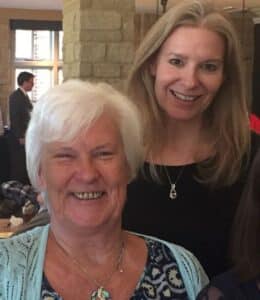
It had all happened so quickly. After Christmas, Mum began to say she was feeling ‘rotten’. Unusual language, and quite specific. Just a few weeks before, she and my father had been among the first valiant post-lockdown tourists to venture Stateside. My parents loved travelling, and especially to America. But that feeling of rottenness persisted, so she went and had a few tests. On the day of my birthday in January we had had had a cheerful conversation on the phone. Later that evening, just as we were getting ready to go for dinner, there was another call. It was Mum. Sounding very tearful. She had been to the hospital and been told they had found some ‘markers’ in her blood. Unfamiliar vocabulary, and needing explanation. It meant the doctors thought there were signs of cancer. ‘This wasn’t supposed to happen’ said Mum, her voice thick with tears.
Planning for the future
The year before, my parents had moved from our old family home in Camberley, Surrey, to a bungalow in 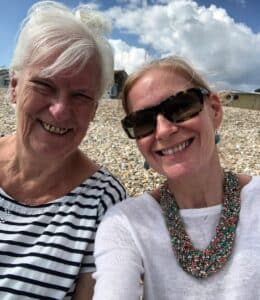
My Dad had done an engineering apprenticeship in Plymouth Dockyards, so had learned everything there was to know about electrics, plumbing, fixing and making. Mum had an artistic eye and made our clothes as we were growing up, as well as my ballet tutus and all our birthday cakes. She was a dab hand at tiling and painting and – her favourite bit – all the designing.
So moving to Sussex had been the start of a post-pandemic life in retirement – with a lovely home by the sea and lots of fresh air, sea views and healthy coastal walks. They had spent the nine months or so since they moved in, decorating everything and getting it all looking lovely. But now began a ten-week journey into heartbreak.
A journey into heartbreak
More tests. A triumphant call one day, revealing the suspected cancer in her remaining ovary was not, in fact, cancer. Smiles abounded. But they didn’t last long. In quick succession over the next few days, it transpired she had two skin cancers, lung cancer, and five brain tumours. The doctors told her she would need ‘palliative care’. More unfamiliar vocabulary. What did that mean – exactly? Were they giving up on her? No treatment? Isn’t palliative care what they give people at the end of their lives, when no more can be done, not at the start of a diagnosis?
The words carried a heaviness we all tried to make lighter. Surely the doctors meant ‘palliative’ as in a holistic approach to managing a complex set of problems. But my Mum – who until a few weeks previously was pottering about perfectly normally – was being told she was going to die. She didn’t look as if she was nearing the end of her life – quite the reverse. She was a strong, tall woman. A bit overweight the last few years, but had all her marbles and was able to beat any of us at Scrabble.
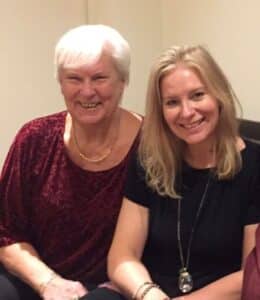
Had we missed the signs?
It’s true there had been some small signs – we had all noticed she had been a little less steady on her feet. And since going on one of the last cruises before lockdown, she had lost her sense of taste and smell. We all thought perhaps she had had Covid – but now I do wonder whether perhaps the brain tumours were already securing a foothold.
The next few weeks brought a series of failed bronchoscopies (a process to extract lung cells for examination). The first was supposed to be a straightforward cell biopsy. But it caused Mum a lot of discomfort and couldn’t tolerate it. Next they tried ‘flushing’ to get some cells. After that, an attempt through the skin – which also didn’t work. And then another two goes at full-on bronchoscopies, neither of which were able to yield any cells at all. But each one caused an infection, and Mum, who had years before suffered pneumonia, seemed to be vulnerable to chest infections.
As the days drifted by and each new infection needed aggressive antibiotics, she began to look unwell. Meanwhile she was back and forth to a different set of clinicians who were looking at scheduling her skin cancer removal. And then a third set of medics was looking after her brain tumours. She was told she should have radiotherapy to try to contain the growth of the tumours. That seemed to make sense – some people live for many years with brain tumours. But in the midst of all of this, her health was failing because of all the failed bronchoscopies and waves of infections. By the time she died, they still hadn’t managed to extract a single lung cell.
Less than two weeks to live
In Spring last year my parents called to say the doctor had told Mum she had less than two weeks to live. I went back down to Sussex. It was mid morning, a Saturday – but my Mum was sitting up in her bed at home. I hadn’t seen her in bed for years. She looked rather glamorous in her gold and ruby nightie, but also weary, and coughing.
The previous week, my brother (who lives in Singapore), my sister and I had joined our parents for their 55th wedding anniversary celebration. We had gone to a local pub and joked about getting together again the following year. Just a seven days later, we needed to call an ambulance. They collected her, and over the next few days there was a blur of drama as she was moved from her first ward, where she caught Covid, to a Covid isolation room, and then a hospice. My Dad stayed overnight with her, sleeping in a chair in her first ward, then a chair in her Covid room, then in a chair in the hospice.
Mercifully, we were all allowed to visit and stay. The hours drifted by, my Dad looking after his girl to the last. The morning she was taken to the hospice, she had sat up in bed and had cornflakes for breakfast. The day before she had made a joke about going on her ‘maiden voyage’, now her decline was steep and rapid. She slipped out of consciousness. My sister and I tried to rationalise what was happening. Nothing made sense.
We continued to talk to her, telling her we loved her. We took it in turn to hold her hands. At one point, she opened her eyes and looked at me, tears gently moistening her cheeks. The woman who gifted me with life and love, was fading away from us. On the evening she died, I took a photo of the sunset as I walked back to the hotel where I was staying. I had a feeling this was goodbye. A few hours later, in the middle of the night, my Dad called.
Nothing can prepare you
What follows is pain, numbness, a ripping sensation through your body and an otherworldliness of fog and 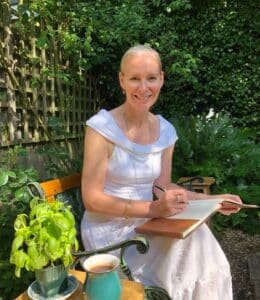
slow motion. Nothing prepares you for the awful rawness of knowing you will never speak to your parent ever again. That you’ll never ever hug them, or feel the touch of their hand brushing your hair out of your eye. Never share any living moments with them, ever ever ever again. Their presence is a permanent, ever present absence.
I still talk to Mum in my head, and I know Dad does, too. I realised after she died that she had been my North Star. I wish I had known that before, so I could have told her. I also realised that there is a secret private members club, filled with people like you and me who bear the special searing pain of grief of losing a parent. Friends and colleagues suddenly let you know that they are also members, and they begin to share their stories with you. I grew closer to people I hardly knew before through the union and communion of parent-grief.
Why don’t we talk about this more?
It made me wonder – why don’t we talk about this more? Until we go through it ourselves? Are we all supposed to be brave and just carry on when the people who make us, or have looked after us through our whole lives are taken from us? Why aren’t there more articles about it, or words of advice and comfort? This is something that affects pretty much all of us. And yet time and time again I discovered that people keep the burden of their heartache locked up, until someone else becomes a reluctant member of the club.
I learned that grief wears different clothes on different days, and surprising things will trigger how it shows up and changes. Nothing prepares you for it, so you can’t plan around it. All you can do is to find ways to give yourself what you need in the moment. Time? Try to make it. Solitude? Seek it out, even for a moment. A hug? Or a chat? Ask someone. Touching something that mattered to the person you have lost, to feel closer? Yes, find it, do it.
A comforting hand
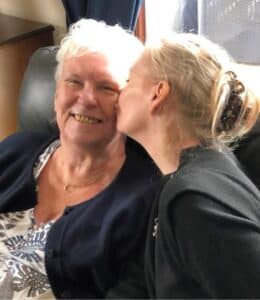
So when the sadness rises up inside me, maybe when I catch sight of my Mum’s mobile number on my phone, or I suddenly remember something she said or did, or I catch the scent of her perfume on the street, I look at the palm of my hands, and feel her presence.
I still can’t quite believe she is really gone. I hold my Dad closely, and walk in grief with him. It’s been a year of firsts for us all. ‘This wasn’t supposed to happen’. No, it wasn’t. But life is for the living. Cherish it.
By Kerensa Jennings

Excellent article, thank you. I lost both parents last year and I can empathise with what you’re feeling now. A year and a half on, it is still raw. I’ve found ways to cope; particularly certain thoughts and sentences. You mentioned yours (from Isaiah); mine was a corny sentiment on a sympathy card that unexpectedly helped (“their life was a string of pearls; treasure and remember each pearl and you will always have the necklace”—sorry, translated very roughly from the original Finnish…). Another was the idea that they do quite literally live on in me, in my DNA and therefore in my arms, legs, heart, etc. I find it hard to be anything but quite concrete about their lives and deaths, but this latter thought helps. It is indeed a club; through the looking glass, a different world—but remember how many of us are in it. Most people over a certain age, for starters, have lost a parent or a spouse. But some when young, too. I was blissfully unaware until it all came crashing down. Remarkably the sky hasn’t actually fallen, and its colours, the trees, the landscape help, even if they make me cry. There are bad days, OK days and even some good days. All the best to you, and you’re not alone.
Thank you so much for this. My dad died 8 years ago and my mum died in October. It is such a rubbish club to be in but it really helps knowing other people who understand. Much love
Thank you so much Karensa for sharing your story. I’m also a member of that club having lost both my parents too soon. 15 years on, I’m still grieving and I miss them both terribly. I hope you and your dad have much more time together. Suzanne
We are at the start of your story. My mum, also Carole, has stage 4 lung cancer and I can’t comprehend how I’ll function when we reach the end part of your story. Thank you for sharing your deepest emotions. I am so sorry you lost your mum – how proud she must have been of you.
I can’t believe how much my emotions resonated with what you wrote about your grief. I too went into a strange, grey fog when I lost my father and I remember almost an out of body experience, where doing all the post death admin of closing accounts down etc left me numb. I would see an old person struggling to walk and I would be in his world straightaway, knowing what was to come and what sadness was waiting for his family. I’d lost people before, but never with such over whelming, desperate sadness, knowing I could never again see them, hear them, complain about them, miss them, get angry with them ever again. That memory book was now formally shut, with no more chances to add anything to it. Eight years on and my grief hits me at peculiar times rather than all day every day like it did at the start. I’m so very sorry for the grief, trauma and sadness you are going through. It is unfortunately a club none of us want to be a member of.